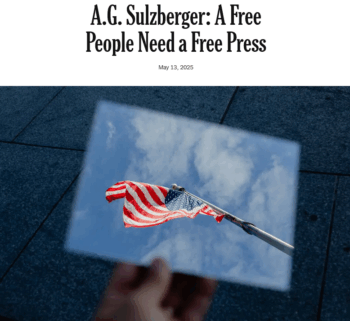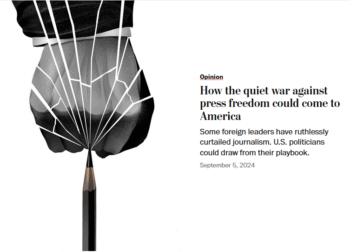
New York Times publisher A.G. Sulzberger (5/13/25) says the press should ask itself, “Were we open-minded enough to unexpected facts?” It’s a good question.
New York Times publisher A.G. Sulzberger delivered an impassioned defense of press freedom to the Kellogg Institute at the University of Notre Dame, which later ran in the Times (5/13/25). At first glance, Sulzberger is repeating what many free press advocates, including myself (FAIR.org, 11/14/24, 2/26/25, 4/25/25), have said, which is that press freedom is under attack, and it is incumbent upon free society to fight back.
Of course, this is A.G. Sulzberger, who clings to the false god of journalistic neutrality at all costs, so his otherwise hard-hitting critique of Trump’s all-out assault on the press and his emphasis on “upsetting powerful interests of every type” is directly undermined by his insistence that “our job is to cover political debates, not to join them,” and that “we are nobody’s opposition” and “nobody’s cheerleader.” (FAIR dissected Sulzberger’s virtually identical arguments about the role of journalism under Trump back in September—see FAIR.org, 9/6/24.)
But the notion that journalists don’t play favorites is belied by another passage in Sulzberger’s updated manifesto. He wrote:
A record number of journalists have been killed or jailed in recent years. Many more are subjected to campaigns of harassment, intimidation, surveillance and censorship. Those efforts have been perhaps most obvious and intense in authoritarian states like China and Russia. But a more insidious playbook for undermining the press has emerged in places like Hungary and India. Places where democracy persists but in a more conditional way, under leaders who were elected legitimately and then set about undermining checks on their power.
What’s most striking about this description is what it leaves out. The link is to a press release by the Committee to Protect Journalists (1/16/25), titled “The Number of Journalists Jailed Worldwide Reached a Near All-Time High in 2024.” “China, Israel and Myanmar were the leading jailers of reporters, followed by Belarus and Russia,” the release stated.
Deadliest country for journalists

Committee to Protect Journalists (2/12/25): “The toll of conflict on the press is most glaring in the unprecedented number of journalists and media workers killed in the Israel/Gaza war, 85 in 2024, and 78 in 2023.”
The fact that Israel found itself in a grouping with authoritarian regimes (most of which dwarf it in population, no less) seems like it would be worth a mention, but Sulzberger didn’t agree. He noted the authoritarian turn in India and Hungary—countries that imprisoned three and zero journalists, respectively, according to CPJ—while ignoring Israel, which jailed 43.
Israel is often pitched to Americans as a Western democratic regime in a neighborhood full of backward autocracies. CPJ noted: “A total of 108 journalists were imprisoned in the Middle East and North Africa, almost half of those detained by Israel.” That means Israel’s jailing of journalists significantly overshadows the press repression in places like Egypt (Amnesty International, 7/25/24) and Iran (Reporters Without Borders, 9/11/23), both of which have far bigger populations than Israel.
But Israel’s imprisoning journalists turns out to be the more benign part of its program of suppressing the press. CPJ also released a report (2/12/25) titled “2024 Is Deadliest Year for Journalists in CPJ History; Almost 70% Killed by Israel.” The report said, “At least 124 journalists and media workers were killed last year, nearly two-thirds of them Palestinians killed by Israel.” The group also investigated Israel’s killing of journalists in Lebanon (CPJ, 10/10/24). Altogether, there were 82 journalists killed by Israel in 2024, 13 times as many as were killed in the next-deadliest countries for journalists, Sudan and Pakistan (with six each).
And the world has known about how dire the situation is for the press in this operation from its earliest stages. Less than two months after hostilities began, the Carnegie Endowment for International Peace (11/28/23) reported, in a piece called “Israel’s War on Journalists”:
Israel’s assault on Gaza has quickly become the deadliest for journalists covering conflict zones since 1992. No other war in the 21st century has been so lethal for journalists, with 34 killed just within its first two weeks.
I covered this issue for FAIR.org (10/19/23) in the Gaza assault’s early days. But downplaying Israel’s often lethal repression of journalism has been a pattern for the Times generally (FAIR.org, 5/1/24), not just for its publisher.
‘Would-be strongmen’

Sulzberger (Washington Post, 9/5/24) wrote that “my colleagues and I have spent months studying how press freedom has been attacked in Hungary—as well as in other democracies such as India and Brazil.” But not, apparently, in Israel.
As mentioned earlier, this is not the first time Sulzberger has made such an omission. Last year, he wrote a lengthy article in the Washington Post (9/5/24) about the decline of press freedom in Hungary, Brazil and India. He wrote that these countries are run by “would-be strongmen” who “have developed a style” of repression against the media that is “more subtle than their counterparts in totalitarian states such as Russia, China and Saudi Arabia, who systematically censor, jail or kill journalists.”
It was an interesting piece, but again, Israel’s war on the press went unmentioned, even though it is a key example of press freedom decline in a Western state where the government has become more illiberal and authoritarian (NPR, 1/12/23; New Statesman, 1/17/23; Foreign Affairs, 2/8/23).
Press freedom in Israel has been on the decline since the invasion of Gaza began in October 2023. In that time, the government has pushed a boycott of the left-leaning newspaper Haaretz (Guardian, 11/24/24), moved to privatize public broadcasting (Jerusalem Post, 11/24/24) and increased censorship (+972, 5/20/24). The country has banned the broadcaster Al Jazeera (5/6/24). After Sulzberger delivered his address, the Israeli government moved to take even more control over broadcasting (Times of Israel, 5/18/25).
Israel’s killing and jailing of journalists, as well as its domestic clampdown and censorship of the press, is arguably at the center of the global crisis in press freedom. The fact that Sulzberger omitted this undercuts his point, because it reinforces the perception that the Times goes out of its way to bury or sanitize unsavory details about Israel’s treatment of Palestinians (FAIR.org, 5/16/25) and advance Israel’s narrative (Literary Hub, 4/30/24)—calling into question his claim that a free press is essential to “arm everyone else with the information and context they need to understand and meet the moment.”
ACTION ALERT: You can send a message to the New York Times at letters@nytimes.com or via Bluesky: @NYTimes.com. Please remember that respectful communication is the most effective. Feel free to leave a copy of your message in the comments thread here.
FEATURED IMAGE: The Committee to Project Journalists’ image of a van from the Al-Quds Al-Youm TV channel that was hit by an Israeli air strike in Gaza in December 2024, killing four journalists and a media worker. (Photo: Reuters/Khamis Said)
This content originally appeared on FAIR and was authored by Ari Paul.